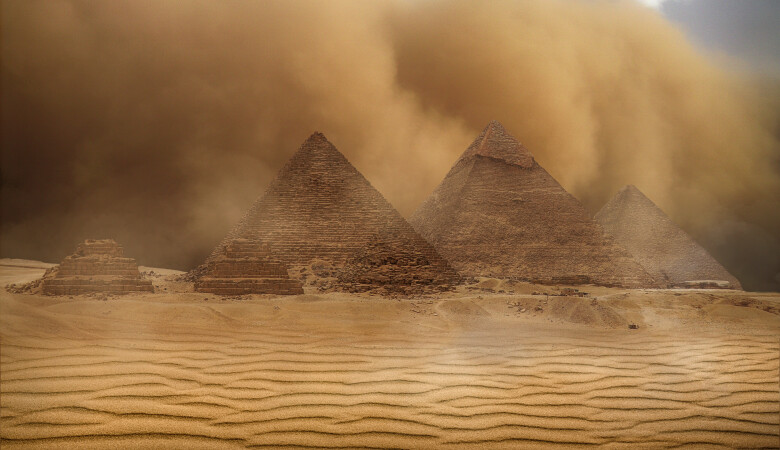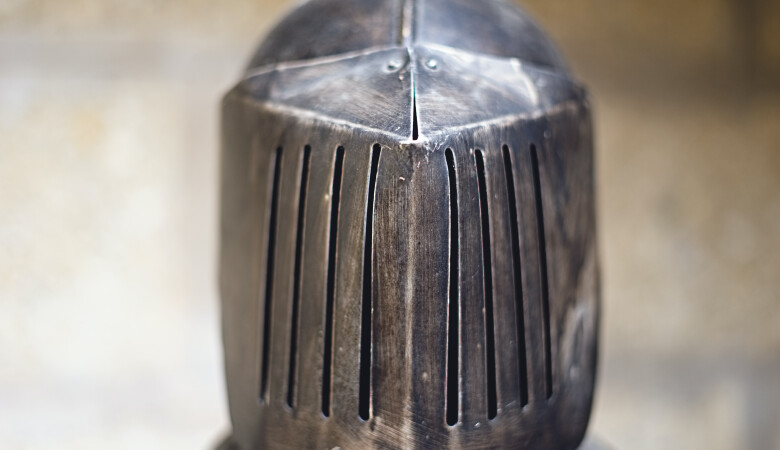The Lord -- A Warrior and Vinekeeper -- Saves His Sinful People (Isaiah Sermon 28 of 80)
September 23, 2012 | Andy Davis
Isaiah 27:1-13
Death & Dying, Love of God
Andy Davis preaches a verse by verse expository sermon on Isaiah 27:1-13. The main subject of the sermon is how God defends and carefully watches of his people though they are sinful.
- Sermon Transcript-
I. The Wicked Serpent Slain
All over the world in every continent there are myths and legends and stories about dragons. That was a shock, wasn't it? Dragons! It's true. In China, for example, the dragon was long the symbol of the emperor of China and of the nation itself, the fierce, winged, reptile fire-breathing dragon. A three-headed dragon is on the coat of arms of the city of Moscow in Russia, and also on the national flag of Wales. And in many cultures, there are stories about the conquest of dragons by heroes that go forth to warfare against them. All of us were encouraged... What verb do you wanna put in here? Afflicted with Beowulf when you were in high school, and read that story of the conquest of that dragon. Others have voluntarily chosen to read The Hobbit, which is Bilbo Baggins struggle against Smaug, the fire-breathing dragon.
Probably the most famous abiding story is that of Saint George, who was historically, as far as we know, a third century believer in Christ, a Roman soldier, who was martyred in the end by the Roman Emperor, for his faith in Christ. But many legends around him concerning his conquest of a fire-breathing dragon. There are a lot of different versions of the story of Saint George and the dragon. He comes to a pagan town in which there is a terrifying dragon nearby that's guarding the fresh water supply. And constantly they're needing to distract this dragon with some kind of sacrifices, frequently young women from the community, so that the dragon is moved off and they can go and get the water they need to survive. And they're finally down to the princess, the daughter of the King, and Saint George comes into this situation and decides to go forth and fight the dragon. And there are a lot of stories about how the battle goes and his lance is shattered into a thousand pieces, and inevitably in these conquests of dragon stories, there's some weak spot, like under the wing of the dragon that the conquerer is able to find, and either shoot an arrow into or shove a sword into and kill the dragon.
Well, those are all myths and legends, and they go back even before the time that Isaiah wrote his prophecy. If you were to have a King James version of Isaiah 27:1, you would see at the end of the verse the word “dragon”. And so we come immediately to the story of a battle. In this case, however, the hero is the Lord. The Lord is going to fight Leviathan, and if you look at verse 1, it says, "In that day, the Lord will punish with his sword, his fierce, great and powerful sword, Leviathan, the gliding serpent, Leviathan, the coiling serpent, he will slay," the NIV gives us, "the monster of the sea." King James will give us "the dragon of the sea."
This is speaking of the coming day of the Lord, and this phrase is repeated again and again in this chapter, in that day, or in that day, in those days, in a day in the future these following things will happen. So we come again to the concept of the day of the Lord, and here we have an epic battle, a hero struggle between the Lord and this monster, this Leviathan. Now who is Leviathan? How are we to understand this Leviathan? In my opinion, the simple answer is that these are the enemies, or this is the enemy of the people of God. And I speak in this language because, as I read history, as I read the scriptures, the ultimate enemy of the people of God is Satan. And he mobilizes human beings, his servants, sons of the devil, who go forth and battle against or war against the people of God, to kill them or make their lives miserable in some way. And so we have really a complex two-fold answer to the question, who is Leviathan?
Leviathan is both a pagan empire that hates the people of God, the Jews in the Old Testament, and Satan who empowers them and directs them in hatred against God's people. And so Leviathan is described in three ways here. Leviathan, the gliding serpent; Leviathan, the coiling serpent, the monster or the dragon of the sea. So the images of a mighty sea serpent, a powerful sea serpent in the sea, the ocean is pictured here as something dangerous and unknown. You can only see the surface, you don't know what's going on down below and what kind of devastating beast there might be, some creature that might swim up from below and devour you. I remember well the summer of 1976 when Jaws came out. And I was forbidden by my parents from watching the movie, but I knew the story, and I'd seen enough clips, I guess on TV or whatever, and I was well aware of the effect that this movie was having on beachgoers.
Well, we didn't go to the beach, we actually went to Lake Winnipesaukee in New Hampshire, and I was convinced the great white shark was going to be devouring me. And it didn't matter what biology lessons my parents were going to give me about fresh water and salt water and all that. I was convinced as I was swimming and couldn't see down below that at any moment I was going to get devoured, it was going to swim up from down below. But these fears have been around for an awfully long time. Think about Christopher Columbus as he sailed west in three ships with sailors who all of them to a man were terrified of monsters of the sea. Frequently there would be charts that would show the edge of the world and beyond, it would say, "Here be dragons." And so there was a terror, a fear of the unknown.
In the Book of Daniel, the sea represents the roiling, churning nations, the mass of the gentile nations with great unknown and it cannot be controlled and it's unpredictable. And Daniel 7 pictures four beasts, one after the other, coming up out of the ocean, out of the sea to oppress the people of God, the Jews. Revelation 7 picks up on this exact same image. And it pictures a dragon standing by the sea and calling forth out of the sea, a beast. And this beast from the sea will be, in some sense, a terrifying world leader who will organize his people or the peoples of the world against the people of God, many call this the anti-Christ. So there is biblical warrant here for seeing Leviathan as a symbol for both the wicked empires themselves, the Assyrian Empire, the Babylonian Empire, the Medo-Persian empire, the Greeks, the Romans, and the dragon behind them, Satan, who calls them forth up out of the sea to do his bidding. And the verse says that God, the Lord will punish Leviathan and slay the monster or the dragon of the deep.
So God is going to fight and he will win. Some say this is an ancient Babylonian myth that Isaiah is using here. The myth of Marduk and Tiamat, I'm not gonna go into details about that. It's not, is my answer, simply. That talks about how, in the Enûma Eliš, that's how, in the Babylonian mythology, that's how the world got created, but this is a battle yet to come. It's a battle yet in the future, in that day. So the first true fulfillment is God's conquest in amazing ways of the pagan, the gentile armies that are gonna come against his people. He's going to dismember them. He's going to sever them, limb from limb, head from tail. But then in the end, he's going to sever the whole thing. He's going to destroy Satan, and all of Satan's people in the end. And so here's a connection to chapter 26, if you were to look at the end of 26, there it describes the end of the world and the earth disclosing the blood shed on it, and all of the suffering of God's people and how God will establish righteousness in the end. And so this is a conquest that the Lord does, both in time in redemptive history, and at the end of the world.
If you look back in Israel's history, before Isaiah, the Red Sea crossing, the same kind of language is used concerning the Red Sea crossing in Psalm 74:13-14, there, Pharaoh's army is defeated by the splitting apart of the Red Sea. And God splits apart the Red Sea and makes a path through the sea for his people to escape. And the psalmist in Psalm 74 says, "It was you who split open the sea by your power; you broke the heads of the monster in the waters." You see, just by splitting apart the sea, God was severing Leviathan. He was severing or dismembering this monster of the sea. Verse 14 in Psalm 74, "It was you who crushed the heads of Leviathan and gave him his food to the creatures of the desert." Now, in the end, the dragon language is established in Revelation chapter 12. And you don't have to turn there, but you can look another time. In Revelation 12, depicts a warfare going on in the heavens between Michael, the archangel, and Satan. And Satan's not strong enough, and he is thrown down to the earth that, it says in Revelation 12, "Now and the great dragon was hurled down, that ancient serpent called the devil or Satan."
So there you've got dragon, serpent, devil, Satan, in case you had any doubt who we were talking about. This dragon was thrown down, the one who leads the whole world astray. But later in Revelation 12, he opens his mouth, the dragon does, and spews forth a river that's supposed to kind of inundate and overtake the people of God. And the earth opens up its mouth and swallows this river. And so again, I think this supports the approach I'm taking, that Leviathan is both the dragon who is Satan, and the river of armies that come forth to slaughter the people of God. And in the end, God's gonna win, Amen? That's what the sermon said. If you don't understand the Book of Revelation, simply, it's this: God wins. So I like that. All the enemies that are against the people of God, God wins in the end.
But the ultimate victory against this dragon is in Revelation 20:10, "The devil who deceived them was thrown into the lake of burning sulfur, where the beast and the false prophet had been thrown. And they will be tormented day and night forever and ever." That is the end of Leviathan, right there. So that's who Leviathan is. What then is the sword of the Lord? This is the sword of the Lord that's going to dismember Leviathan, that's gonna cut it apart, limb from limb. Three adjectives used to describe it here, his sword is fierce, great and powerful sword in the NIV. Hard, some translations give it, it's a hard sword. In other words, it battles but no detriment to the sword, no notches in it. It doesn't break, it doesn't get dull ever. It's hard, it's strong, it's mighty, it has power, and it never changes.
Well, we know from many other passages what the sword of the Lord is, don't you know? It says that we are to take up the sword of the Spirit, which is the Word of God. Or in Hebrews 4:12, "The Word of God is living and active, sharper than any double-edged sword," etcetera. And so the sword of the Lord is his mighty word. By simply speaking the word, he dismembers Leviathan. Isn't that awesome? And how awesome is that picture that God, all he has to do is simply give the word and Leviathan will be dismembered. And so there is an already in a not yet aspect to this, Isaiah 27:1. In some sense, we'll talk more about this toward the end of the sermon, Leviathan has been dismembered. He has been slain and in some sense, he is being slain right now, and in some sense, he will be slain yet to come. So he didn't, God didn't just want one little quick victory over Leviathan, he wants a long drawn out dismemberment. He kind of wants to torture Leviathan and kind of sever him in many different ways. And that's what we have here. Well, the result of this, in verses 2 through 6, is a vineyard that fills the whole world with fruit.
II. The Vineyard Fills the World with Fruit
Basically, let me give you just an outline right now of the whole chapter, so you can understand what's going on. We have the battle between the Lord and Leviathan in verse 1, and God wins and dismembers Leviathan. You have in verses 2 through 6, a fruitful vineyard, Jacob, that fills the whole world with fruit. You have in verses 7 through 11, Jacob's punishment or the chastening of the people of God for their sins, but not as far as God could have done. He chastens them to purify them so that they get rid of the idols in their lives and crush the Asherah poles and incense altars and make them like chalk stones. He crushes their idols so that they can be pure. They get judged but not like the nations, the pagan nations, that get judged worse. And so God's people are disciplined and purged of their sins. And then in the end, versus 12 and 13, there's a trumpet call that goes out around the world, recalling the elect of God together, assembling to worship Him eternally.So that's the whole chapter. Isn't that a marvelous story?
So, I think you know, in the end I'm gonna get to preach the Gospel from this chapter. You have a sense of that? Do you have an instinct? We're gonna, in the end, talk about Jesus from this chapter. How could it not be? But now we're in verses 2 through 6, and we have this, as a result of the slaying of Leviathan, you have this marvelous fruitful vineyard. Look at verses 2 through 6. "In that day," again that phrase repeated, “In that day– ‘Sing about a fruitful vineyard: I, the Lord, watch over it; I water it continually. I guard it day and night so that no one may harm it. I am not angry. If only there were briars and thorns confronting me! I would march against them in battle. I would set them all on fire, or else let them come to me for refuge; let them make peace with me, yes, let them make peace with me.’ In days to come, Jacob will take root, and Israel will bud and blossom and fill all the world with fruit.”
So here we have a song about a fruitful vineyard. And it happens in that day, again in the day of the Lord, when God moves out and acts powerfully, in history, when God gets going and does stuff, the results here is a fruitful vineyard. The day of the Lord brings not just judgment, but fruitfulness. The day of the Lord looks ahead to the end of the world. And here we have, for the second time in Isaiah, a song about a vineyard, but a very different one this time. You could take and flip back if you want to Isaiah 5, or you can just listen, but some of you will wanna look back at Isaiah 5, and here we have, in Isaiah 5, the first song about a vineyard. But the problem with that vineyard is it wasn't fruitful. Nothing good came from that vineyard. It produced only bad grapes.
So if you look at that song in Isaiah 5:1-7, there Isaiah sings this song, he said, "I will sing for the one I love," that's the Lord. "I will sing for the one I love a song about his vineyard: My loved one had a vineyard on a fertile hillside. He dug it up and cleared it of stones and planted it with the choicest vines. He built a watch tower in it and cut out a winepress as well. Then he looked for a crop of good grapes, but it yielded only bad fruit. ‘Now you dwellers in Jerusalem and men of Judah, judge between me and my vineyard. What more could have been done for my vineyard than I have done for it? When I look for good grapes, why did it yield only bad? Now, I will tell you what I'm going to do to my vineyard: I will take away its hedge, and it will be destroyed; I'll break down its wall and it will be trampled. I will make it a wasteland, neither pruned nor cultivated, and briars and thorns will grow there. I will command the clouds not to rain on it.’" Interpretation in verse 7, "The vineyard of the Lord Almighty is the house of Israel, and the men of Judah are the garden of his delight. And he looked for justice, but saw bloodshed; he looked for righteousness, but heard cries of distress."
Now, that was the first song about the vineyard, and it's a bad song. It's a tragic song, it's a tragedy. The problem there with Judah and Jerusalem is that God was looking for fruitfulness and got nothing but bad grapes. And so then God says, in Isaiah 5, he's going to judge his vineyard by taking away its wall of protection, and it's gonna get trampled. If you don't know what that's talking about, then you haven't read a lot of Isaiah. You know exactly what's gonna happen. He's going to literally break down the wall of Jerusalem and the invaders are gonna come in and trample it. He's gonna take away its wall or its hedge of protection, and the invading armies are going to trample it. And he's gonna command the clouds not to rain on it. And this is the avenues of grace, the richness of God's grace, the rain is God's provision for his people. Let's say through the ministry of the word how the prophets come to speak God's word, but he says there's gonna be a famine of the word of the Lord, they're not gonna hear it. I'm gonna shut down the prophets. There won't be any and there won't be any words from the Lord about it.
And in the end, you get briars and thorns and again that goes back to Genesis 3, that's curse language, that the land will be cursed with thorns. Well, that's Isaiah 5, go back to Isaiah 27. I like a happier song, don't you, than a sad one? I mean there's a place in God's providence for sad songs and happy songs. This one's a happy song about the vineyard. So we return to the same thing but this time it's a very different outcome. Here in verse 3, I'm in Isaiah 27 now, "The Lord waters it continually" do you see that? It's continually provided for, constant outpouring of power and grace for fruitfulness. Every moment this vineyard gets everything it needs to be maximally fruitful, and in verse 3, "I the LORD watch over it continually and will not allow anyone to trample it or harm it." Isn't that fantastic? So everything's different here in Isaiah 27 than in Isaiah 5. And he says he's going to guard it and watch over it day and night, nothing can harm it. He who watches over you will not slumber. He who guards you will neither slumber nor sleep, Psalm 121. And he says, his wrath is gone. Look at verse 4, NIV very meek there, “I am not angry.” I like ESV better, “I have no wrath, my wrath is gone.”
In the past, God was enraged at Israel's sinfulness. He had an active wrath against them, he unleashed his judgments and wiped out all but the remnant, now his wrath is completely gone. He's not angry anymore. And so later in Isaiah's prophecy, he will say this to his prophet, he speaks to his prophet in Isaiah 40, and he gives him direct orders, "Comfort, comfort my people, says your God. Speak tenderly to Jerusalem, and proclaim to her that her hard service has been completed, that her sin is atoned for, that she has received from the Lord's hand double for all her sins.” The provision for their sins is ample and sufficient. And, in verse 4, God apparently searches for enemies but doesn't find any. You get the sense of some like black belt karate expert, who's got like all these weapons and he's just looking for someone to fight. Now that's a bad attitude. But here God is saying, "I wish there were someone I could fight to show my zeal for my people, there are no enemies left. I wish that there were briars and thorns confronting me. I wish there were was some evidence of curse around me because then I would take it on and destroy it too."
God is so zealous to protect his people at this point. He's almost taunting wickedness and enemies to come and take him on and say, "We'll let's see what will happen there." The Lord is a mighty warrior. And he's saying, "Oh you wanna take me on then fight me. And then you'll see my zeal for my people." And he will just burn up any briars and thorns that would be confronting him. Or he actually says at that point, "I have a better idea, suppose the briars and thorns just come and make peace with me instead," he actually says it twice, "Yes let them make peace with me." It's a terrifying thing for the Lord to be your enemy, but what a delightful thing for him to be your Savior.
“It's a terrifying thing for the Lord to be your enemy, but what a delightful thing for him to be your Savior.”
At one time, we were enemies in our minds, as demonstrated by our evil behavior. At one time, we were God's enemies. For if when we were God's enemies we were reconciled to him through the death of his son how much more, having been reconciled shall we be saved by his life? So God says, "Why don't you come and grab hold of me for refuge." The image is this Old Testament image like in I Kings, when Solomon takes the throne, remember how Adonijah almost got the throne but didn't quite make it, and God chose Solomon instead, and Adonijah at this point, I wouldn't sell him life insurance. It's a bad, bad place to be. But God granted him some measure of grace. He had run into the tabernacle and taken hold of the horns of the altar, I Kings 1:50. And then in I Kings 2, Joab did the same thing. He went in and took hold of the altar, it's a sense of running for refuge. And that's the picture we have here in Isaiah, 27. “Instead of running away from me, why don't you turn and run to me, and throw yourself on my mercy, and I will show you mercy. Everyone who calls in the name of the Lord will be saved. So let them make peace with me that's a better idea, let them find refuge in me.”
For it happened to Saul of Tarsus, breathing out murderous threats against the Lord's disciples, the Lord threatened him with instant destruction, this brilliant light shining around him, but he's calling him instead to salvation. He deserved to die. He knew it, he deserved to die because he was a blasphemer and a persecutor and a violent man. But God showed mercy to him. And so God is ready to show mercy to his enemies. So he says, "Let them make peace with me." And the result of this verse 6 is universal fruitfulness for the people of God. "In days to come, Jacob will take root and Israel will bud and blossom and fill all the world with fruit.” Once Leviathan is slaughtered and the Lord is directly protecting his vineyard day and night and watering it continually, it's going to fill the whole world with fruitfulness. It's gonna be stunningly fruitful. And notice the language it's Jacob here. That's all of God's people not just the northern kingdom, or the southern kingdom, the split apart people of God. No this is Jacob. These are the people of God, and Israel. And they're going to take root, and they're going to have a fantastic root system, and they're going to draw nourishing sap from that root system. And they're going to bud and flourish, that means they're going to be very, very healthy, the people of God. And as a result, they're going to fill all the world with fruit.
Friends, this can be nothing less than the fulfillment of the promise made to Abram in Genesis chapter 12 when he said in verse 3, "I will bless those who bless you, and whoever curses you I will curse, and all peoples on earth will be blessed because of you." Like Jesus said to the Samaritan woman, "Salvation is from the Jews." And so, God would choose a remnant of his people, and He would make them fruitful worldwide, and there would be a worldwide harvest of fruitfulness for Jacob and Israel. And at last, the Lord will have what he intended from the beginning, his people will be fruitful for all eternity.
III. The People Punished by Measure, But Only to Purify
Now, in verses 7-11 we have the people punished. So we in effect we have to go back a bit and then we see what produces this. Again let's keep in mind when Isaiah lived and when he made this prophecy. The Assyrians hadn't come yet, the Babylonian certainly hadn't come yet. These two exiles are still in the future. And when the people go through it, they're going to be confused, they're going to be tempted to be confused, "Has God forsaken us? Are we still the people of God?" And so he is very clear and honest about this. The people of God are about to go through a very hard time. And that's what verses 7-11 are describing. And yet it's only by measure, the hard time is going to be carefully measured out to produce God's end, and God's end is to purify them of their idols. So look at verses 7-11, "Has the Lord struck her," that's Israel, I think, or Jerusalem, "Has the Lord struck her as he struck down those who struck her? Has she been killed as those were killed who killed her? By warfare and exile you contend with her– with his fierce blast he drives her out, as on the day the east wind blows. By this then will Jacob's guilt be atoned for, and this will be the full fruitage of the removal of his sin: When he makes all the altar stones to be like chalk stones crushed to pieces, no Asherah poles or incense altars will be left standing. The fortified city stands desolate, an abandoned settlement forsaken like the desert; there the calves graze; there they lie down; and they strip its branches bare. When its twigs are dry, and they're broken off and women come and make fires with them. For this is a people without understanding, and so their maker has no compassion on them, and their Creator shows them no favor."
So this is going back and explaining what's going to happen before, before the fruitfulness of Jacob in order to clear out the idolatry and the wickedness. So this is a difficult section. But Israel's about to be seriously stricken by God, smashed hard for their sins. Israel is going to be struck hard, it's going to be like on the day an east wind blows like a dry desert wind, or a Sirocco, that causes everything to wither in its path. Verses 10 and 11 describe just exile conditions when you, if you were to go to Jerusalem, you know, 10 years later or something like that and there's just nothing there it's just desolate.
Like in the book of Lamentations when the prophet Jeremiah looks over the city when the exile has happened and he says in Lamentations 1:1, "How desolate lies the city once so full of people." They are all gone. So we have this pastoral scene like calves that are grazing and just wild animals roaming and roving and a few women coming and finding some dead branches that they can break off or gather from the ground to use for firewood. It's a picture of death and judgment really and a very tragic picture.
But also the middle of this section there's a sense in which yes it's going to be bad, it's gonna be really bad. But it's not as bad as it could be. And so in verse 7, he asks the question, "Has the Lord struck her”, Israel, “as he struck down those who struck her?" The Assyrians and the Babylonians let's say. Did she get the same thing that they got? The implication is no, they get worse actually, that's the implication of the question, they get actually worse treatment from God. “Has she been killed, as those who were killed who killed her?” Again, no. So, there's going to be a hard time, and she's going to be struck, she's going to be in some sense killed, but not in the same way. It's not going to be as bad, well, what's the difference?
Well, when the Assyrians invaded the northern kingdom, they destroyed many cities, killed lots and lots of people, and exiled the rest. When the Babylonians invaded the southern kingdom, the kingdom of Judah and the city of Jerusalem, they did the same thing: they crushed lots of towns and villages, they killed lots and lots of people and exiled the rest. But God has measured out Israel's punishment. NIV in verse 8, it's a very difficult verse but it says, "By warfare and exile you contend with her." The ESV is a little bit better, "Measure by measure by exile you contend with them." So God has measured out the discipline. He doesn't crush her as badly as she could have been crushed. You get this picture in Ezekiel's ministry, Ezekiel was ministering around the time of Jeremiah, and around the time the Babylonians came in. And Ezekiel was told to take a sharp sword and hone it like a razor and cut off the hairs off his head. So, shave his head remember? And then he's told to do different things with the hairs, he's told to divide them into thirds, and take a third of, take scales and measure out the hairs, and divide them up and take a third of your hairs and strike those hairs with the sword, and take a third and put them in into this his little replica of the city and burn it with fire, and kill them in the city, and then take the third pile and scatter it to the winds and chase them down with the sword. But take a few of your hairs and hide them in the cloak of your garment. Now, who are those few hairs? What are those hairs? Those are people, friends, those are seeds for the future. The Assyrians didn't get that, they didn't get that. The Babylonians they didn't get that. Have you met any Assyrians recently? Do you have any Assyrian friends? Is there a mission to the Assyrian that's going on right now? Is there a new tribes mission to the Babylonians? Friends, they're extinct. They were pursued to death, so also the Philistines, chased to death, but not so the Jews. And God said he would do this.
He told this to Isaiah, remember in Isaiah 6, he calls him, "Here am I Lord, send me." All right, time for the mission. "What do you want me to say?" "All right, go tell the people be ever hearing but never understanding, be ever seeing but never perceiving, make the people's heart callous, make their ears dull and close their eyes, otherwise they might see with their eyes and hear with their ears and understand with their hearts, and turn and I might heal them.", "Well, that's a really bad message Lord, how long do I have to preach that?", "Well here's the answer, until the cities lie ruined and without inhabitant, until the houses are left deserted and the fields ruined and ravaged, until the Lord has sent everyone far away and the land is utterly forsaken, and though a tenth remains in the land, it will again be laid waste, but as the terebinth and oak leave stumps when they are cut down, so the holy seed will be the stump in the land.
Guys, that's the remnant, those are the few hairs stuck in the folds of the garment. That's the seed for the future. And so no, she wasn't killed as those who were killed who killed her, and she wasn't struck as those who were struck... Who struck her. They get extinction, Israel doesn't, why, because God has a plan for Israel. There is a vibrant, sap-filled root system in the patriarchs: Abraham, Isaac and Jacob and in the promises made to them that means that they're going to come back and flourish. And so yes she'll be judged and punishment will be bitter, exile will happen, it will be like the a dry Sirocco wind, and it's going to wither everything. But the end result will be that they will turn away from their idolatry and hate it as much as he does. That's why he's doing it. So, you remember back in Isaiah 22 when God called on his people to weep and to wail, to tear out their hair and put on sackcloth remember that? And instead they partied, instead they had a big feast.
Well after the exile there are actually two stories of hair pulling. It's something to look into. Okay, it's like stories of hair pulling, yes there's two stories of hair pulling, in Ezra and Nehemiah. Ezra pulled his own hair, when he found out that the people had started to intermarry again. He's like, "Ugh, what are you doing? Don't you understand what's happened? And now God's opened a little door for a remnant to come back and get established and look what you're doing, all over again." That's Ezra. Nehemiah pulled their hair. That's Nehemiah, okay, "I'm not pulling my hair I'm pulling yours." Look it up. That's the zeal and the passion inside them for them to hate their Asherah poles and their incense altars and crush them like chalk stones.
IV. The Elect Gathered by Trumpet Call One by One
That's not the end of the story, verses 12 and 13, the elect will be gathered by a trumpet call one by one. Look at verses 12 and 13, "And in that day the Lord will thresh from the flowing Euphrates to the Wadi of Egypt, and you, Israelites will be gathered up one by one. And in that day a great trumpet will sound, and those who were are perishing in Assyria, and those who were are exiled in Egypt will come and worship the Lord on the holy mountain in Jerusalem."
So in that day, in the coming days, The Lord will thresh, threshing is separating the wheat from the chaff. He's going to separate out the wheat of his people. He's going to call the wheat to himself. John the Baptist said he's going to gather up the wheat into his barn and he's going to burn the chaff with unquenchable fire. He's going to thresh from the Euphrates to the Wadi of Egypt that was the promised land. Those were the extents of the promised land. They would know exactly what that territory meant. But the call would go beyond even to distant lands where the people had been scattered and there would be this trumpet call and the people would reassemble.
And then in the history of Egypt, or the history of Israel, the trumpet was a call to the people to assemble together for some purpose. Maybe the coronation of a king. Or maybe the people assembled at Mount Sinai to receive the law of Moses, assemble with the trumpet call, or maybe they would be assembled for battle to fight against their enemies, it was a trumpet call. As a matter of fact it was built into the law of Moses, the year of jubilee there'll be a trumpet call going out, and all the people would assemble together for worship and in the year of jubilee all debts would be canceled and all slaves set free, and everyone would return to their ancestral land, and it happened every 50 years so that meant probably you got one in your lifetime. Maybe if you got one when you were two and one when you were 102 you get two, but that's the exception. You might get it when you're 25, you might get it when you're 13. Okay? Who knows when it would happen? And that call would be a call of assembly and deliverance from all sin.
And so this trumpet call goes out to assemble the people of God to come together at his holy mountain and worship and to praise him. Now Isaiah has already talked about this assembling at the holy mountain, and it's more than just the physical descendants of Abraham, Isaac and Jacob. It says in Isaiah chapter 2, "In the last days the mountain of the Lord's temple will be established as chief among the mountains, it will be raised above the hills, and all the nations will stream to it. Many peoples will come and say, ‘Come let us go up to the mountain of the Lord, to the house of the God of Jacob. He will teach us his way so that we may walk in his path.’” And so this trumpet call is going out to the ends of the earth to get the remnants to assemble and worship, end of chapter.
V. The Gospel of Jesus According to Isaiah 27
Now it's time to preach Jesus. Okay, so who is the Lord that dismembers Leviathan? His name is Jesus. How does he dismember him? By dying on the cross and rising from the dead. It says in Hebrews chapter 2, "Because the children”, the elect, “have flesh and blood, he too”, Jesus, “shared in their humanity, so that by his death, he might destroy him who holds the power of death– that is the devil– and free those who all their lives were held in slavery by their fear of death.” I like the word destroy. For our purposes in Isaiah 27:1 how about dismember, amen? So that by his death he might dismember Satan, limb from limb. And how does he do it also? By his advancing Kingdom. As missionaries and evangelists go out and they take the good news of the gospel, and they proclaim that good news, Satan's kingdom shrinks every time it happens, and Satan is frustrated and he can't stop the elect from coming to faith in Christ. And ultimately by his second coming when he comes back in Revelation 19 and there's a sword, a fierce great and powerful sword coming out of the mouth of the rider on the horse, and with it he will slay the wicked.
I don't think Jesus is literally going to have a sword coming out of his mouth. I think he's going to speak the word and the Antichrist will be gone. He's going to speak the word and the armies that oppose him will be destroyed. He just simply speaks the word. 2 Thessalonians 2, "The man of sin is the one whom the Lord will destroy by the splendor of his coming and by the word of his power, the breath of his mouth.” And so, the Lord Jesus will establish his people as a fruitful vineyard, a fruitful vineyard. We are, as I've mentioned before, gentiles grafted into a tree with a root system under us that's nourishing us with Jewish kind of spiritual blood, and we're deriving life from the promises made to Abraham, Isaac and Jacob, and we are flourishing, and Jesus is the vine and we are the branches and we are to bear much fruit for apart from him we can do nothing. It's in Christ that we are the fruitful vineyard.
“It's in Christ that we are the fruitful vineyard.”
And it's in Christ or because of Christ alone that God says in verse 4, "I have no wrath. I'm not angry at you. There's no condemnation for you, my wrath is appeased. The blood of Jesus has been shed, my wrath is propitiated," in Romans chapter 3, "He is the propitiation for our sins, the one who turns away the wrath of God." God's not angry at you anymore because of your sins. And in Christ alone can his enemies run and flee and take hold of him for refuge. Can I just urge you to do that today, if you consider yourself right now, an outsider, the Bible says that you are under the wrath of God if you're an outsider. Flee the wrath of God. Come and take hold of Jesus.
You're asking how do I do that? Just ask him to be your Savior. Just say, "Lord I'm a sinner, I'm on the outside, I'm afraid of your wrath, I don't want to go to hell. I don't want to stand before you and give an account for my wickedness and my lust and my laziness, will you please save me? Would you please save me from my sins." And he will. He says, "Let them make peace with me, yes let them make peace with me, that's a better idea.” Why don't you come to Jesus and let him make peace with you, let him reconcile you. And in Christ alone the remnant of Jews is saved, that remnant that it discusses here, that remnant of Jacob and Israel find their salvation and their fruitfulness in Christ alone.
And God still measures out our disciplines. He doesn't crush us like our sins deserve. He'll hurt you. He'll spank you, he'll train you. But measure by measure. And he does it according to the Book of Hebrews, he disciplines us so that we may share in his holiness and may bear fruit for him. And so God measures up disciplines when you're under the discipline of the Lord realize he's dealing wisely with you, and causing you to hate your sins and crush your own altar stones, whatever they are like chalk and get rid of them out of your life.
What about that trumpet call? Could it be we're called on to blow that trumpet? That we are called on to go out this week and talk to people about Jesus, that were called to say, "Hey, why don't you come to Christ, why don't you believe in him? Come from outside where the judgment of God is and come in and come to faith, and let God bless you. Let him forgive you of all your sins. We are the trumpet blasts. We're the ones that got out to the ends of the earth and say, "Come to faith, come to Christ." Close with me in prayer.
Father, we thank you for what we've learned in your word, we thank you for Isaiah 27. It's a chapter that perhaps we're not very familiar with but I thank you for being our hero, for going out to take on the dragon and fight for us 'cause we couldn't fight for ourselves, and to deliver us and rescue us, Oh Lord. We were weak and powerless and we could not save ourselves but you went forth as a mighty warrior Jesus, and you fight and you fought for us and you died on the cross and you rose again. Oh God I pray for any lost person right now that they would hear this gospel message and be saved and help us O Lord to know how much you love us, and how much you're watering us constantly and causing us to be fruitful, help us to be fruitful for your glory, and we pray in Jesus name, amen.































